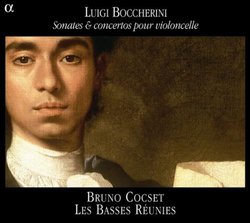| All Artists: Bruno Cocset, Emmanuel Jacques, Mathurin Matharel, Luigi Boccherini, Richard Myron, Xavier Diaz-Latorre, Lucas Guglielmi, Les Basses Reunies Title: Boccherini: Sonates & concertos pour violoncello /Les Basses Reunies * Cocset Members Wishing: 0 Total Copies: 0 Label: ALPHA PRODUCTIONS Original Release Date: 1/1/2006 Re-Release Date: 12/27/2005 Album Type: Import Genre: Classical Styles: Chamber Music, Forms & Genres, Concertos, Historical Periods, Classical (c.1770-1830), Instruments, Strings Number of Discs: 1 SwapaCD Credits: 1 UPC: 3760014190841 |
Search - Bruno Cocset, Emmanuel Jacques, Mathurin Matharel :: Boccherini: Sonates & concertos pour violoncello /Les Basses Reunies * Cocset
 | Bruno Cocset, Emmanuel Jacques, Mathurin Matharel Boccherini: Sonates & concertos pour violoncello /Les Basses Reunies * Cocset Genre: Classical
|
Larger Image |
CD Details |
CD ReviewsMay Must! Giordano Bruno | Wherever I am, I am. | 05/11/2010 (5 out of 5 stars) "I'd stake my credibility as a reviewer that 'everybody' will be as thrilled by this recording as I am. The three sonatas for cello concertante and continuo are among Boccherini's boldest, most original compositions, requiring a specific historically informed virtuosic technique. They are beyond the capacity of the modern cello, so much so that Bruno Cocset had a special instrument constructed for them, to support the clarity and violin-like timbre of the extreme upper register, using the arched back typical of an earlier 'viola bastarda.' If you hear sounds from this instrument that are NOT part of the usual voice of the modern cello, it's because: 1) Boccherini specified such sounds, 2) modern cellists have been taught to eschew many of the performance practices that Boccherini employed, 3) cellist Bruno Cocset is skilled enough to make musical sense of Boccherini's eccentric, flamboyant writing. Besides the frequent passages of high notes at the physical limit of the cello's range, in the 'region of eternal snows' where rosin from the bow dusts the strings white, Boccherini's sonatas plunge to the lowest register; require complex double and triple stops; call for bowing with the wood, at the bridge, 'trampolining' on the strings, and other distinctive effects. As was normal in the 18th C, the realization of the basso continuo was at the pleasure of the performers; Cocset has assigned it to a second cello in two of the sonatas here, and to a guitar and double bass in the third. The results are very attractive. The two 'concertos pour violoncelle' recorded between the sonatas will be much more familiar to classical music devotees; they've both been recorded several times, by richard lester and others. Cocset has chosen to 'arrange' them as chamber concerti or 'quartet sonatas', reducing the orchestra parts to fit an imaginary occasion, a time-machine visit by Boccherini to the studio of Cocset's ensemble 'Les Basses Reunies'. But this is also warranted by historical practice; Boccherini himself published arrangements of concertos as sonatas and vice-versa.
Can a composer be assigned to the Pantheon of the Greatest solely on the basis of his genius in one genre, particularly the intimate genre of 'chamber music'? In Boccherini's case, I think so. After all, Richard Wagner's and Frederick Chopin's claims to greatness are based on their mastery of a single genre, opera for the former, solo piano for the latter. And if I think about the works of Beethoven, it's his quartets above and beyond all that elevate him to the apex of musical genius. Boccherini wrote symphonies, a few chamber operas and cantatas, and brilliant orchestral concerti, but his chamber works -- quartets and quintets for strings, with guitar or piano on occasion -- dominated his output and have rightly proven most attractive to modern listeners. This performance of three of his many sonatas should, I think, elevate that form to a par with the quintets. But what are these sonatas "about"? To my ears, they're about the cello itself, about the musical moods and manners of that instrument, which was Boccherini's own. Just as Chopin and others wrote to explore the totality of their piano and their pianistic technique, Boccherini wrote music to elicit all the expressiveness of the cello. Cellist/musicologist Elizabeth Leguin, in her grand study titled "Boccherini's Body", theorizes that the basis of 'enjoyment' of such music is a sort of physical empathy, with the composer 'inhabiting' the musculature and posture of the performer and the 'listener' perceiving the music not just aurally but bodily. Thus it's not just the physical energy of Boccherini's music that stimulates the listener's sensibilities but also the entire late-18th C cultural devotion to "figure", that is, to dance, gesture, posture, politesse. I could write a book... Perhaps I WOULD write a book, but Dr. Leguin has already written such a fine one that I need only to urge people to hear this superb performance and let the music plead its own cause." |

 Track Listings (15) - Disc #1
Track Listings (15) - Disc #1